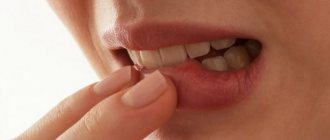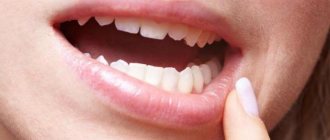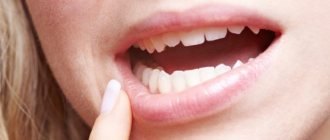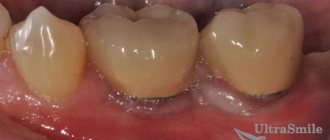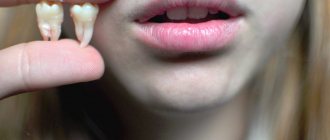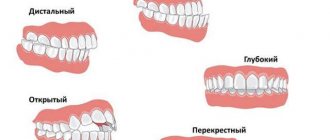Many people have noticed that tooth pain is often accompanied by a sore throat. This is explained by various reasons, for example, by the fact that toothache simply “gives” to the throat. This, by the way, is partly correct, but this is not the only reason.
For example, pain may be felt in the throat when a wisdom tooth erupts.
. At first glance, the tooth and throat belong to completely different organs, but the relationship between them can be explained.
Suppose the wisdom tooth that is erupting is located on the lower jaw. As this process develops, the tooth begins to squeeze or push away the developed roots of the neighboring tooth, which is the reason for the appearance of uncomfortable sensations that also develop in the throat, and not just in the jaw itself, since the masticatory muscle is located close here. As a result, it is quite possible that painful sensations may occur when swallowing. Quite often, pain signals a probable inflammatory process in this area. If this happens, and the right solution would be to urgently relieve the inflammatory process, and this can best be done by a dentist. His work will consist of prescribing anti-inflammatory drugs and treating the cavity with an antiseptic. Soda mouth baths are usually recommended. You should also monitor changes in body temperature. If your general health worsens, you should immediately contact a dental clinic and have the tooth removed.
It’s not just your wisdom teeth that may be to blame for painful throat sensations. They can be caused by diseases of the teeth and surrounding tissues. Such diseases include galvanic syndrome, periodontitis, and teething pathology.
Pain in the throat and teeth due to stomatitis
In addition, we should not forget about the inflammation of the oral mucosa, which leads to pathologies of the surface layer and the occurrence of erosions. Such erosions are characterized by severe pain and may be accompanied by a burning sensation. They can also cause a sore throat.
Inflammatory processes can manifest themselves in different ways. In particular, this may be inflammation of the peri-apical tissues, inflammation of the nerve, carious cavity, or dead pulp.
However, if there is also pain when swallowing, also known as a sore throat, you should be wary and be sure to visit a dentist. It is likely that the tooth will have to be removed.
Definitely, if the pain affects both the teeth and throat, then there is no way to do without a doctor. Of course, if you have a sore throat, it is logical to consult an ENT doctor. Try to determine the nature of the pain and which pain appeared first - in the throat or toothache? It is quite possible that you have a cold, and then you also have a toothache. Before and the tooth may ache due to severe hypothermia. Or maybe it’s just a toothache and it goes down into the throat. It is best to visit both doctors. Here it is important to refuse self-medication, or at least, while carrying out it, do not refuse to visit a doctor. Even ordinary compresses and rinses are best done after consulting a doctor.
Attention, TODAY only!
Everything interesting
A persistent sore throat in the morning is usually associated with heavy smoking. Experienced smokers often experience a sore throat, which resembles the symptoms of a cold. At the same time, neither nicotine nor other substances that a cigarette is rich in...
Probably each of us at least once in our lives has felt what a sore throat is. As a rule, it comes in the morning, you feel like your throat hurts, there is a feeling of stuffiness, it’s difficult to speak, lethargy appears throughout the body and you want to sleep. Pain in…
For some reason, with the onset of cold weather, the throat is the first to react to a drop in temperature. It would seem that you went outside - no wind, no rain, no frost, but your throat starts to feel sore and after a few hours it starts to hurt. Some people immediately open their first aid kit and...
You can detect the moment when a sore throat begins. When you wake up in the morning, you swallow saliva and feel that it hurts to swallow it. If previously this was an imperceptible reflex, then it suddenly becomes a painful and alarming experience for a person.…
Some teeth begin to emerge as adults, around the ages of 17 to 25. At this time, frivolous youth ends and wise maturity begins. Therefore, teeth that appear at this age are called wisdom teeth. But…
Once upon a time, the appearance of wisdom teeth was considered a sign of maturation and increased intelligence. Now everyone understands that intelligence has nothing to do with them, but that problems with their growth may increase. First of all, these are pain sensations that are localized in nearby tissues and organs. Do you need to endure them stoically or is it better to go to the dentist and find out exactly what hurts and how to treat it?
Navigation
Features of wisdom teeth growth
By the age of 18, a person has 28 teeth. After this age and until about 30 years old, at the end of each row, 4 more appear above and below. These are wisdom teeth. Nature conceived them, taking care of people who previously lost their chewing organs at an early age due to insufficient hygiene and the predominance of roughage in the diet. Wisdom teeth could replace them.
Modern man has no need for these organs; rather, problems associated with the period of growth are added. The reason for most of them is that the formation of the bone tissue of the jaws has completed by the time of eruption. There is not enough space for wisdom teeth, and they grow as fast as they can, causing pain and discomfort. In addition, they do not replace milk teeth, which means they do not have a ready-made conductive channel that would facilitate their eruption. Unpleasant sensations are caused by the thickness of the walls of the dental sac, the size and density of the gum mucosa.
Lack of space for the organ can cause crowding of all or part of the dentition, also accompanied by pain. It, in turn, is complemented by high fever, swelling, and difficulty opening the mouth. This can take a long time, since wisdom teeth do not erupt quickly either. All these signs mean inflammation of the surrounding tissues, including bone. Therefore, visiting a dentist is inevitable.
It is difficult to clean your wisdom teeth well, and often those nearby, because of the problems mentioned. Their location deep in the jaw, where it is difficult to reach with a brush, also plays a role in this. Therefore, even at the growth stage, a wisdom tooth can become carious; it can also transmit infection to its neighbors. Sometimes the disease affects him while he is in the gum.
In short, the appearance of wisdom teeth is almost always accompanied by problems. It is necessary to ensure that they do not approach life-threatening frames. After all, the brain is located in close proximity.
True, in extremely rare cases, wisdom teeth do not grow at all. If the reason for this is the absence of their rudiments, this does not pose any danger.
When to take antibiotics
If a patient with a sore throat, despite the treatment, maintains a body temperature for more than 2 days, there is a deterioration in the general condition, the cough intensifies or there is excessive salivation, vomiting or loss of consciousness, it is necessary to urgently consult a doctor who will prescribe appropriate treatment.
For follicular and lacunar tonsillitis, you cannot do without the use of antibiotics, especially in childhood. The most effective drugs for angina are penicillin antibiotics: ampicillin, amoxiclav, amox, augumentin and others. For more severe disease, cephalosporins are prescribed: cefazolin, ceftriaxone, cephalexin, intramuscularly or intravenously, or macrolides: vilprafen, sumamed or azithromycin.
After treating a sore throat, it is very important to follow a gentle regime for 2-3 weeks, avoid hypothermia, overwork, physical and neuropsychic stress, eat well, get plenty of rest and spend at least 1-2 hours a day in the fresh air. Such measures will help avoid the development of complications.
If the doctor has diagnosed - then there is no reason to become depressed. First of all, you should understand the condition of the disease, and then begin treatment. The chronic form of any disease is dangerous only because it worsens during certain periods and is difficult to treat, so it should not be neglected.
Tonsillitis is a chronic sore throat. When infection first appears, it is necessary. Many people say that any traditional herbal recipe is not effective and resort to pills, but it is worth remembering that it is impossible to cure tonsils in a week. Tonsillitis, like tonsillitis, is an infectious disease and in order not to catch it, you should strengthen the body's immune system.
So, the disease has appeared or the chronic form has worsened, what needs to be done:
- Seek help from a specialist, not a therapist, but an otolaryngologist.
- If you can’t see a doctor, you can look with a flashlight and a mirror. When the tonsils are inflamed, the palatine parts are dark red and swollen;
- Gargle with available means, for example, saline solution or chamomile.
- Be sure to measure your body temperature. If the temperature rises to 39 degrees, it is advisable to take an antipyretic. Remember, if the temperature rises and this happens for several days, this is a problem, it’s time to seek help from the department or go to see a doctor out of turn.
- When the disease progresses and cannot be treated at home, the patient will be offered hospitalization or tonsil removal.
An aggravated disease is a sign of not being treated; in order to avoid reaching such a state, let’s turn to traditional medicine. You can treat tonsils in an adult in different ways, with decoctions and tinctures.
In all centuries, people have gotten rid of illnesses with the help of herbs. They collected, dried, and then used herbal preparations. Every disease can be easily treated with herbs, but the path to recovery is longer than using medications. The use of herbs that have anti-inflammatory properties will give a positive result. Here are some simple recipes for treating chronic.
Tonsillitis is an infection that enters the body due to a weakened immune system, and to kill two birds with one stone, prepare a remedy from garlic. You will need equal parts garlic and vegetable oil. Mix the ingredients and refrigerate for 5 days, and then take 10 drops 2 times a day.
Collection for the treatment of tonsillitis - chamomile, sage, St. John's wort, horsetail, string, violet leaves, pine buds. It is recommended to mix this collection in equal proportions, pour boiling water, leave and take ½ cup at least 3 times a day. Another collection consists of currant leaves, yarrow, motherwort, celandine grass, and angelica roots.
We invite you to familiarize yourself with Gel for gums Solcoseryl Denta and other ointments for treatment
Ready-made mixtures numbered 37 and 43 for the treatment and prevention of complications of the disease are available in the pharmacy, take according to the instructions. The fees are contraindicated for children under 12 years of age and during pregnancy.
What to do if inflammation of the tonsil is detected on one side? Gargle with herbs, remedies, irrigate with ingalypt, lubricate with solutions. Lugol is the most popular, but it is not advisable to use this ointment to treat tonsillitis in children. Full treatment must be carried out according to the rules - each procedure at a certain time. A prerequisite for the treatment of the inflammatory process:
- Irrigation of the tonsils with an antiseptic;
- Lubricate with solution, ointment;
- Do not eat for an hour after the procedures;
- Use of steam and other types of inhalation;
- Timely use of medications.
But what to do if the condition does not improve, do you need to remove the tonsils? No. If herbal remedies and rinses do not provide improvement, it is time to use an antibiotic. The drug is selected individually, based on the characteristics of the patient’s body. You should not select the drug yourself, especially for a small child; you should consult a doctor.
Treatment
In this short time, you can independently reduce the pain with the following medications:
- Ketanov;
- Analgin;
- Ketarol;
- Tempalgin;
- Etoricoxib.
They are used orally with water 3 times a day, and the last medicine is enough once a day. If there is no effect, the dose should not be increased, this can lead to poisoning. This indicates that the process already requires the intervention of a specialist.
For topical use it's worth trying:
Rinsing the mouth with herbal decoctions relieves pain and disinfects a little:
- Sage, if you brew 2 tbsp. 0.5 liters of boiling water and leave for an hour;
- Oak bark. Here you need 6 tbsp per 0.5 liter of water. Boil for 5 minutes.
If the inflammatory process in the gum lasts longer, it becomes purulent. The pain, like swelling, intensifies, the general condition worsens, and the temperature rises. The sensations are localized not only in the gum area, but also in the throat, jaw, and radiate to the ear. When you press the hood covering the location of the wisdom tooth, foul-smelling discharge comes out. Here one cannot do without surgical assistance to cut the mucous membrane at this point and remove the masticatory organ, because the consequences can be unpredictable and the most terrible, including blood poisoning and death. Even if the patient has high immunity, and the purulent contents have safely broken into the oral cavity, from where it was expelled by rinsing, the disease is sure to recur. Periostitis will then occur with the penetration of exudate into other tissues and cavities. A characteristic sign of such suppuration is increased facial asymmetry. The side where the wisdom tooth is cut becomes noticeably more swollen. The patient is no longer able to open his mouth on his own; the doctor has to do this. Lymph nodes are enlarged and painful.
What to do if the gums at the end of the lower jaw hurt?
Pain syndrome that occurs in the gums, at the end of the lower jaw, causes people severe suffering and a lot of inconvenience. This category of patients faces problems in the process of drinking hot or cold drinks, chewing food, and talking.
Dental diseases can provoke discomfort, so people need to immediately get advice from highly specialized specialists.
Main reasons
Modern medicine considers the following factors as the causes of pain:
- Pathological processes in the gums, occurring in both chronic and acute forms, for example, periodontitis or periodontal disease.
- A wisdom tooth is erupting, the consequences of its removal or opening the hood.
- Inflammation caused by infectious diseases, for example, measles, tonsillitis, otitis media, caries.
- Insufficient content of vitamins in the body.
- The occurrence of neoplasms of a malignant or benign nature.
- Mechanical damage to the gums, due to which an inflammatory process develops.
- Use of specific medications.
- Accumulated plaque, etc.
Signs
Painful sensations in this part of the jaw, regardless of the cause, are in most cases accompanied by characteristic symptoms:
- swelling appears;
- bleeding occurs;
- redness of the mucous membranes is observed;
- purulent masses may be released;
- in case of serious pathologies, the temperature rises, fatigue increases, and general weakness occurs.
Diagnostic methods
People will not be able to determine the cause of discomfort on their own. That is why they need to contact dental clinics if they experience pain.
Highly specialized specialists will examine the oral cavity, collect anamnesis, and take x-rays. If indicated, patients will undergo a hardware examination using a tomograph.
What to do?
Every person who experiences pain in the gums at the end of the lower jaw should not take any medications without medical prescription.
This is due to the fact that self-medication often leads to serious complications.
That is why you first need to go to a hospital, undergo a comprehensive examination, after which a highly specialized specialist will prescribe medication or surgical treatment.
If the gums at the end of the lower jaw hurt and radiate to the throat
This pathological condition can develop in people against the background of the progression of chronic diseases, both dental and ENT.
Cheek hurts and is swollen
Most often, this condition is observed in patients who have the following pathologies:
- flux;
- bad tooth;
- condition after dental treatment.
It hurts to swallow
When a person experiences pain when swallowing, he most likely develops an inflammatory process in the pharynx.
Discomfort can also be caused by a foreign body stuck in the throat or mechanical damage to the mucous membranes.
Sore gums and lymph nodes
Lymph nodes can hurt with the development of dental ailments, sore throat, otitis media, and malfunctions of the immune system.
Also, helminthic infestations, mechanical damage, neoplasms, etc. can lead to their inflammation.
During pregnancy
During pregnancy, women often experience problems with gums. This is due to the radical restructuring that occurs in the body.
Also, pathological conditions develop against the background of decreased immunity, lack of vitamins, and unbalanced nutrition.
What to rinse with?
To eliminate painful sensations, people are advised to rinse their mouths with special antiseptic solutions, for example:
- Chlorhexidine. The medicine is diluted in water in accordance with the recommendations specified in the instructions. Manipulations are carried out after brushing your teeth, no more than three times a day.
- Miramistin. The drug is able to eliminate pain and also destroy pathogenic microorganisms.
- Hydrogen peroxide.
How to relieve pain?
Patients can quickly eliminate discomfort using Ketanov tablets. This drug has a very powerful analgesic effect.
Experts recommend taking a tablet every 4-6 hours. Children can be given Nurofen syrup or Adolora tablets, which can be used from the age of sixteen.
How to treat?
If inflammation is added to the painful sensations, patients will be prescribed special medications.
They should be taken in accordance with the dosage determined by the doctor.
Drugs
To relieve inflammation, the following medications can be used:
- Holisal;
- Metrogil;
- Asepta;
- Kalgel;
- Dentagel;
- Kamistad gel, etc.
Traditional methods
To eliminate painful sensations, people can use folk recipes, provided there are no contraindications and individual intolerance to the components included in them:
- Soda-salt solution. To prepare it, you need to pour a glass of water into a deep container, into which soda and salt (a teaspoon each) are poured. After thorough mixing, it should be used for rinsing. You can add a few drops of iodine to the soda-salt solution. Manipulations should be carried out every two hours.
- For mouth rinsing, it is recommended to use herbal infusions made from eucalyptus, calendula or sage.
- A good effect is achieved by using chamomile infusion. To prepare it, dry and crushed grass (1 tbsp) is poured into a deep container, which is poured with boiling water (1 l). The contents of the dish should be infused for 15 minutes, after which it is filtered. The collected liquid is used to rinse the mouth.
Prevention
If people carry out preventive measures in a timely manner, they will be able to prevent the development of pathological processes that can provoke discomfort:
- You should visit the dentist regularly;
- it is necessary to treat infectious diseases in a timely manner;
- You need to maintain oral hygiene every day.
What does jaw pain mean when wisdom teeth erupt?
It is almost always difficult for the patient to determine exactly where pain is felt during the eruption of a wisdom tooth. It seems to exist everywhere. But if there is also a cyst on it, as a rule, the sensations are clearly manifested in the jaw area. This is a fluid-filled formation that forms due to the long eruption of wisdom teeth.
In addition to pain in the jaw, the cyst also has symptoms:
This condition requires medical intervention, since an accurate diagnosis can be established using an x-ray, then it is necessary to check the absence of a tumor using a puncture. The cyst is filled with liquid contents. As temporary pain relief measures, you can use rinsing with cool decoctions of sage, chamomile, eucalyptus, thyme, cranberry juice, and Kalanchoe.
Treatment when it comes to wisdom teeth is surgical. It is removed, and the cyst cavity is drained. To avoid inflammation and the addition of infection to it, the patient is prescribed antibacterial drugs.
Delaying medical help will lead to cyst growth and bone tissue damage.
The list of possible complications includes:
Another cause of pain in the jaw during the eruption of a wisdom tooth may be its improper growth. If it tends towards neighboring organs, they inevitably move. Their movement causes trauma to bone tissue and. The treatment method here is the same, that is, wisdom tooth removal. It’s not worth delaying this, waiting for a malocclusion, which will also have to be corrected later.
Treating swollen tonsils at home
The doctor must decide how to treat swollen tonsils. Self-medication will not only be useless, but also dangerous - the infection from acute can develop into chronic, which is more difficult to cure. Sluggish chronic diseases affect the state of the immune system and provoke the risk of developing pathologies of the heart, kidneys and musculoskeletal system.
What to do if your tonsils are swollen and it hurts to swallow? Let us present the general principles of conservative therapy. An individual treatment regimen is prescribed by a doctor, relying on the results of laboratory and instrumental diagnostics.
So, if the gland is swollen, treatment should be etiotropic.
Viral diseases are treated with antiviral drugs: Arbidol, Remantadine, Ingavirin, Kagocel.
A bacterial infection must be treated with antibiotics. Most often, preference is given to broad-spectrum agents - Amoxicillin, Ciprofloxacin, Azithromycin. If a throat smear has been examined, antibiotics of the group to which the microflora is sensitive are prescribed.
For fungal infections, antifungal drugs are prescribed, such as Pimafucin, Nystatin, etc.
If the tonsil is swollen, how to treat it locally? For this, not only gargling with antiseptics (Furacilin, etc.), but also throat sprays (Stopangin, Yox), and lozenges (Lizobakt, Strepsils) are suitable. All these topical agents have a good anti-inflammatory and regenerating effect. They can also relieve pain in the throat, which is important in the first days of the disease if the left gland, the right, or both are swollen.
Symptomatic treatment includes the prescription of antipyretics and non-steroidal anti-inflammatory drugs. Immunomodulators and antihistamines are also prescribed. In case of inflammation of the tonsils, strict bed rest is indicated until complete recovery in order to prevent possible complications.
In order to soothe sore tonsils and relieve swelling, it is necessary to disinfect and soothe the irritated surface.
rinsing; inhalations; warming up; compresses; drinking medicinal liquids.
If your throat hurts, then it needs to be treated comprehensively. To do this, you should definitely take medications prescribed by your doctor, use traditional medicine, and, if necessary, resort to physiotherapy.
Rinse
This method of treating swollen tonsils is used if a sore throat, pharyngitis or laryngitis is diagnosed. The rinsing process soothes inflamed tonsils, helps remove purulent plugs, swelling, and pain.
Solution "Furacilin". Dissolve 1 tablet in a glass of warm water. Gargle a swollen throat 3 times a day. Iodine solution. Add 3 drops of iodine to a glass of water. Rinse every 40 minutes. Apple vinegar. Mix 1 tbsp. l. vinegar in a glass of water. Gargle a sore throat with this remedy up to 5 times a day.
Inhalations
This method of treating swollen tonsils is permissible only if the disease is not accompanied by an increase in body temperature.
Hot steam warms the throat perfectly, medications penetrate deep into the throat and affect the source of infection. As a result of this, not only the pain goes away, but also the swelling of the tonsils is eliminated.
Boil the potatoes in their skins, do not drain the water, add 5 drops of turpentine. Bend over the hot steam, cover your head with a towel, breathe for 5 minutes. After just 3 procedures, the tonsils will become normal sizes. Add 2 tsp to hot water (500 ml). propolis tinctures. Inhale this solution 3 times a day.
Mix equal amounts of oregano, chamomile, and calendula. Take 2 tbsp. l. collection, pour boiling water (500 ml), let cool slightly. Carry out inhalation 4 times a day. Add 10 drops of eucalyptus oil and 5 drops of anise oil to a boiling kettle (0.5 liters of water). Breathe over the steam for 10 minutes, 2 times a day.
Inhalations help to quickly relieve swelling of the tonsils, destroy pathogens, moisturize the mucous membrane, suppress inflammatory processes in the pharynx, and also increase local immunity.
Warming up
Don't know what to do if your tonsils are swollen? Try warming your throat. Just be careful: often this method of treating inflamed tonsils can provoke the spread of the inflammatory process to other parts of the pharynx and even internal organs.
Warming should be used only after doctor's approval.
Wrap warm sea salt in a clean cloth. Place the bag on your throat in the area of the tonsils; warming up the whole body: steam your feet in hot water with the addition of sea salt or mustard powder; wrapping a warm scarf around the throat, and at the same time putting woolen socks on the feet.
In order to quickly remove swelling of the tonsils, it is necessary to disinfect and soothe the irritated throat. To do this, it is useful to take honey, onion, garlic, ginger, and propolis internally.
Compresses
Brew sage (2 tablespoons of herb per 150 ml of boiling water), moisten a piece of cloth in it. Squeeze it and apply it to your throat. Secure the compress with cling film, simply wrap it around your throat, and put a warm scarf on top; Dilute medical alcohol in warm water in a ratio of 1:3. Dip a cloth or gauze into the solution, apply it to the throat, insulate it;
You need to keep the compresses all night.
If your throat hurts or swelling does not go away after home treatment within a week, then this is a reason to contact an ENT specialist. After a thorough examination and laboratory tests, the specialist should prescribe a course of intensive therapy.
Fluid intake
warm milk; tea with lemon or raspberry jam; decoctions of medicinal herbs: chamomile, mint, sage, rose hips. You need to drink at least 2 liters a day. This will help quickly relieve swelling; warm fruit drinks, juices, compotes.
What to do if the tonsil is swollen on one side and what does this mean?
Unilateral inflammation of the tonsil is not uncommon, but is an indicator that the infection is still in a small area of the larynx, and the human immune system does not allow it to spread further.
The tonsil on one side may swell with diseases such as influenza, pharyngitis, laryngitis, tonsillitis.
Also, such an unpleasant phenomenon can happen to a person who has suffered a mechanical injury, for example, a fish bone is stuck in the lymphoid tissue.
Fluid intake
Why does my cheek hurt?
There may be several explanations for this symptom:
- Already mentioned pericoronitis. Under the dense gingival hood, which has a large area, food debris accumulates, with which bacteria actively “work.” In this place inflammation occurs, then suppuration. Left without professional treatment, the disease covers an ever-increasing area. Pus penetrates into soft tissues, including the cheeks. This is an absolute reason to run to the dentist. If a wisdom tooth needs to be preserved, treatment is limited to trimming the hood, extracting pus, and antibacterial therapy. If there is no need for it, an operation to remove it is performed;
- Incorrect growth of wisdom teeth. When there is not enough space in the row, it changes its normal position and can be directed, deviating towards the cheek. The mucous membrane is chronically injured, which first causes discomfort, then pain. The damage at first provokes stomatitis, which either plays out or heals with the formation of scars. But since the main traumatic factor remains in place, inflammation occurs again, and in advanced cases, a tumor may later form at the site of the wound. So the treatment in this case consists of getting rid of the cause, that is, the wisdom tooth.
If the tonsils are inflamed: reasons
When microorganisms enter the tonsils, they are recognized by cells of the immune system, after which a reaction is launched aimed at creating immunity to these bacteria, and the causative agents of infectious diseases are destroyed. If there are too many pathogenic microorganisms, and the person’s immunity is weakened for some reason, then the tonsils cannot cope with their task and become inflamed.
Acute inflammation of the tonsils is called tonsillitis, and chronic inflammation is called chronic tonsillitis. The fact that the tonsils are inflamed will be indicated by symptoms such as a feeling of discomfort when passing food and swallowing, sore throat, difficulty breathing, general weakness, and increased body temperature. The tonsils become swollen and red, and purulent plugs may be observed on their surface.
We invite you to familiarize yourself with the description of the operation of the nasal irrigator
Sore throat and wisdom teeth
Quite often, when a wisdom tooth erupts, especially if it is located on the lower jaw, a sore throat appears. This symptom can be similar to the manifestation of a sore throat, but in this case the sensations are localized only on one side. Upon examination, it is easy to see swelling and redness; the pain intensifies when swallowing, but does not go away with rest. The submandibular lymph node on the side of the cutting tooth is also enlarged.
To relieve the symptom, you can gargle with decoctions of medicinal plants (chamomile, sage, thyme, calendula). It is important that they are not hot or even warm. If a purulent process has begun in the tissues, such treatment will be harmful. It is better to take a rinse at room temperature.
Pharmaceuticals can also be used:
If this treatment does not help, the sore throat intensifies, the temperature rises, swelling appears on the cheek or neck, you cannot wait any longer. You need to rush to the dentist, as such signs indicate a bacterial infection. Most likely, the tooth will have to be removed, the purulent contents pumped out, and treated with antibiotics.
Sore gums, ear and throat on one side, how to treat
Very often people suffer from ear and throat pain on one side.
Some go to the doctor with such complaints, but most try to cope with the ailment on their own.
Therefore, it is important to understand what can be done in such situations and what not. And also understand when it is no longer possible to postpone a consultation with a specialist.
Sore throat radiates to ears: causes
All ENT organs are a communicating system. The throat and hearing organs are connected to each other by the Eustachian tubes located on the right and left sides.
Thanks to them, the pressure in the tympanic cavity is equalized, which is required for distinguishing sounds, performing respiratory, swallowing and speech functions.
The entrance to the Eustachian or auditory tube, which opens into the mouth, is much wider than its opposite end. In adults it is quite convoluted and its length is about 3.5 cm.
In children, the auditory tube is quite wide and short, which explains the fact that they are much more likely to experience pain in the throat and ears when swallowing at the same time.
The close connection between the Eustachian tubes and the oropharynx provokes the fact that during inflammatory processes in the nasopharynx, microorganisms easily penetrate the auditory tubes and, rising through them, affect the tympanic cavity. As a result, patients may notice that first their throat hurts, then their ears hurt.
- This situation is typical for ARVI and bacterial infections. If treatment is not started in time, the nerves can also become involved in the inflammatory process. The ENT organs are innervated by the trigeminal, glossopharyngeal and vagus nerves. One of their functional tasks is to control the orbicularis muscle, which compresses the pharynx.
- Therefore, in the absence of competent therapy and the spread of inflammation to the nerve fibers, not only a sharp pain in the ear and throat can appear on one side or another, which radiates to the head, but also severe neuralgia. Treatment of such complications is long and complex, so it is much better to prevent their development.
- Inflammation can be unilateral or bilateral. But in the vast majority of cases, soreness and discomfort are felt only on the right side; somewhat less frequently, this is observed on the left side.
Diseases that may be accompanied by discomfort in the ear
Among the common causes of a sore throat that radiates to the ear are the following diseases:
1
Pharyngitis is an extensive inflammation of the posterior wall of the pharynx and velopharyngeal arch, usually characteristic of children over 6 years of age and adolescents. This is accompanied by diffuse discomfort in the throat of varying intensity, while it is usually painful to swallow and hoarseness is often observed. The throat causes congestion in the ears, which in the absence of proper treatment will lead to ear damage.
2
Sore throat (tonsillitis) is the most common reason for pain in the throat and ear on one side, since most of the adult population of the planet has this pathology in a chronic form. It is characterized by periodic exacerbation, which is accompanied by a feeling of rawness in the throat and fever.
But the main distinguishing feature is that the tonsil becomes covered with a white coating or plugs form in it. This is often accompanied by pain in the ear when you swallow. Moreover, in most cases the right side suffers.
3
Laryngitis is an inflammation of the larynx, which is often accompanied by swelling of the mucous membranes. In a child, swelling often compresses the respiratory organs, which causes difficulty in inhaling and exhaling, and a characteristic whistling and cough appears.
A sore throat is also typical, which increases the frequency of dry cough attacks. In adults, laryngitis often develops due to smoking, working in hazardous industries, or the need to speak often and for a long time.
4
Sinusitis is an inflammatory disease of the paranasal sinuses. The maxillary or maxillary and frontal sinuses are most often affected. The pathology is characterized by fever, nasal congestion, runny nose of varying degrees of intensity and headaches.
In serious forms of pathology, the formation of purulent discharge and disruption of the outflow of contents from the affected sinuses is possible. This provokes a deterioration of the condition, severe pain when tilting the head forward, which can radiate to the ear.
5
Lymphadenitis is inflammation of the lymph nodes. Most often, only one half of the cervical lymph nodes are affected, which is accompanied by fever, weakness, redness of the skin and the formation of lumps in the affected area.
Often with lymphadenitis, the throat and ear hurt, which is due to the close relationship of all elements of the lymphatic system with each other, and the tonsils are an accumulation of lymphoid tissue. In addition, many patients complain that the ear is blocked, and the intensity of the pain increases when swallowing saliva and turning the head.
Source: nasmorkam.net
When such diseases occur, pathogenic microflora can ascend through the Eustachian tubes into the ear and provoke inflammation in it. This is called otitis media. With it, patients complain that:
- pain or shooting in the ear;
- pawns ears;
- gives into the ear when swallowing;
- hearing worsens.
Source: https://ormira.ru/bolit-desna-uho-i-gorlo-s-odnoj-storony-chem-lechit/
Can the eruption of wisdom teeth cause headaches and ear pain?
This symptom sometimes accompanies a normally growing wisdom tooth, if it is located on the upper jaw, and the complications already mentioned in this process. In the first case, local remedies applied to the gums will help, and to eliminate headaches you can take Analgin or Ketorol.
When a wisdom tooth grows incorrectly, inflammation of the trigeminal nerve also occurs. Then the pain in the head is accompanied by the same sensation in the ear, twitching of the facial muscles. Symptoms appear more pronounced when brushing teeth, shaving, and eating. This disease cannot be overcome with home remedies, rinses and tablets. You will have to use surgical methods and be treated with anti-inflammatory drugs.
Neuralgic pain in the head and ear also indicates an unerupted wisdom tooth. Its absence on top of the gum and its presence in its thickness is dangerous due to damage to the roots of neighboring organs and their complete destruction. This happens when the wisdom tooth is incorrectly positioned when it lies in a horizontal plane. Hence the pain and swelling of adjacent tissues. The salvation will be surgery to remove the wisdom tooth.
Always associated with upper respiratory tract diseases or colds. However, there are also diseases of other organs.
Classic treatment of gum inflammation near wisdom teeth
Treatment tactics for inflammation of the gums near the wisdom tooth depend on the severity and etiology of the disease. If the pathological process has developed due to changes in hormonal levels, it should be restored - there is no need to remove the inflamed molar.
Inflammation of soft tissues in the oral cavity can be a consequence of stress; such patients need high-quality psychological help and taking sedatives.
Drug treatment
If the gums become inflamed due to injury, the doctor may prescribe the following procedures to the patient:
- applications with Retinol and Befungin;
- rinsing the mouth with antiseptic drugs: Miramistin, Furacilin, Chlorhexidine, Mephenamine (these same medications will help cure gingivitis);
- taking vasoconstrictor medications: Vasopressin, Ephedrine, Naphthisin.
The cheek and gums may become swollen when there is severe inflammation within the body. In this case, antibiotics are indicated to avoid sepsis.
Treatment of pericoronitis
If the gums near the last tooth hurt due to pericoronitis, treatment will occur in several stages:
- Anti-inflammatory therapy using appropriate medications.
- Installation of drainage on the gum if ulcers have formed on it.
- Opening the hood above the figure eight.
- Further actions depend on the condition of the wisdom tooth:
- if it is damaged or affected by caries, it will be removed;
- If everything is fine with the tooth, the doctor will remove the gum hood and treat the wound with an antiseptic.
How is a wisdom tooth treated?
If the gum tissue around a wisdom tooth becomes inflamed and swollen due to tooth decay, the dentist may not remove the wisdom tooth but rather treat it. But only if the molar has an antagonist, or if in the near future it is planned to install a prosthesis attached to the figure eight.
The manipulation is performed under local anesthesia. Procedure:
- isolation of the third molar from the soft tissues of the jaw;
- cleansing its surface from saliva and pus;
- treating the caries-affected area with an antiseptic;
- drilling out tissues affected by caries;
- applying insulating material to the bottom of the cleaned cavity;
- filling the dental cavity with polymer;
- polishing the filling.
Treatment of caries on a wisdom tooth is no different from the treatment of other molars. The only difference is that more effective anesthesia is used during the procedure. You need to be prepared for the fact that within 2 days after the manipulations the figure eight will ache.
If, some time after treatment of a wisdom tooth, the gums around it become swollen and pain begins to occur when swallowing, you need to go to the dental clinic again. This symptom may indicate the development of inflammation due to errors during treatment. Most often, repeated inflammation of a healed wisdom tooth becomes the reason for its removal , since the gums near the molar will not stop festering until the source of infection is destroyed.
Stomatitis
With aphthous stomatitis, aphthae are formed on the oral mucosa - round-shaped erosions. They are covered with a white or yellowish coating with a red border. They occur in single copies, but more often they are scattered on the palate, the inside of the lips, and there are ulcers in the throat. Aphthae are quite painful, cause severe burning and bother you while eating.
Symptoms of the disease are:
- spread of erosions in the oral cavity;
- a sore throat;
- inflammation of the lymph nodes;
- low-grade fever.
Stomatitis in the throat can be caused by a viral infection, gastrointestinal diseases, or a lack of vitamins C and B. The most likely cause is considered to be a malfunction of the immune system, which mistakenly mistakes protein compounds for foreign ones. Recovery occurs in 6-10 days.
In adults, stomatitis occurs for the following reasons:
- poor oral care or disregard for personal hygiene rules;
- low-quality dentures;
- smoking;
- chronic diseases.
If you have a sore throat, it is often caused by a sore throat and cough that appears during the discharge of mucus due to sinusitis or rhinitis.
Inflammation of the tonsils: causes
Children often suffer from tonsillitis, since their immune system is not as strong as that of adults.
Therefore, microbes, entering the lymphoid tissue of the tonsils, begin to actively multiply there, secrete the products of their vital activity, thereby causing an inflammatory process with intoxication. With strong immunity, the tonsils are actively involved in their work and suppress the proliferation of bacteria, but if the body’s protective functions are insufficient, inflammation occurs that requires treatment. There is debate among experts about the need for tonsils, because on the one hand they are a protective barrier, and on the other hand they are a carrier of infection. In this case, it is important to note that healthy tonsils protect the upper and lower respiratory tract from microbes entering them. Thereby preventing the development of bronchitis and pneumonia.
If the tonsils harbor a chronic infection, which, with the slightest accompanying factors, makes itself felt in the form of inflammation and even abscesses, and conservative treatment methods do not produce results, they must be removed. The decision on surgical intervention is made by the doctor, after appropriate tests and observations of the patient.
Regarding the reasons why the tonsils may become inflamed, these include:
- bacterial infection, in 80% of cases it is streptococcus, but it can also be staphylococcus and pneumococcus;
- a viral infection can also cause inflammation, but less frequently;
- fungal infection.
Factors for infection are:
- caries, which is also a chronic source of infection in the mouth;
- dirty hands, unwashed vegetables or fruits;
- close contact with a previously ill person;
- weakened immunity as a result of hypothermia or other diseases.
Teething
The causes of a sore throat can be different, but the most likely is the eruption of a wisdom tooth. The problem is especially common during impaction, when it remains in the gum.
The eruption of third molars occurs quite late, when there is no more space. This causes a lot of difficulties:
- development of pathologies in the form of retention or dystopia;
- inflammation of the gums around the crown;
- development of periodontal disease.
When a wisdom tooth erupts, a severe sore throat occurs, the gums and lymph nodes swell, and the temperature rises. Additionally, the patient complains of increased temperature, pain in the gum and cheek, and swelling of the face.
Dentists recommend removing third molars long before infection occurs. However, you should be prepared for the fact that the pain will not disappear in the first 2-3 days after the operation. This is a completely normal reaction of the body, since the vessels, nerve endings, and soft tissues were injured.
Important! If you experience severe pain in the throat after removing figure eights, you should urgently consult a dentist - a serious complication in the form of alveolitis is possible.
When faced with problematic eruption of third molars, it is necessary to seek advice not only from a dentist-surgeon, but also from an orthodontist. Overbite often leads to malocclusion.
Often wisdom teeth cause pain after eruption. They are located far in the jaw and are difficult to clean. Therefore, they quickly begin to deteriorate and are accompanied by pain. At the same time, the lymph nodes swell and the throat becomes inflamed, like a cold.
Painful eruption and incorrect position during germination
Periods of active wisdom teeth eruption often cause discomfort. Many people experience pain during this process, swelling and inflammation of the gum tissue. The reason for this manifestation is the absence of the previous milk tooth in the place where the figure eight grew. Third molars are forced to find a path of growth and break through dense bone tissue, which, given the large size of these teeth, becomes the cause of discomfort. Often, the lack of space for the normal position of the figure eight leads to its complicated germination.
Treatment
It is necessary to treat a sore throat only after identifying the cause of the disease. Any pathology of the gums and teeth can cause severe pain and lead to serious complications, so a visit to the doctor cannot be postponed.
For mild stomatitis, treatment is carried out at home. Antiseptic agents, chamomile and sage are used. If your throat hurts severely and the ulcers are massive, complex therapy is required. The doctor prescribes rinsing the mouth and throat with antiseptic drugs: a solution of hydrogen peroxide, furatsilin, chlorhexidine. Additionally, antihistamines and sedatives, and taking vitamins are indicated.
Pyrogenal, Lysozyme, Prodigiosan are taken in combination with medications. A remedy for sore throat with propolis, a solution of citral, will help speed up the healing process. To prevent relapses, it is recommended to take Decaris.
Aphthous stomatitis is directly related to diseases of other organs. Therefore, therapy for concomitant diseases is necessary.
Treatment of sore throat during the eruption of wisdom teeth begins with rinsing with decoctions of chamomile, sage, oak bark or soda and salt. Folk remedies have an analgesic and anti-inflammatory effect.
For medications: chlorhexidine or Eludril. The product "Angilex", which is produced in the form of a spray and solution, will help both with painful teething of baby teeth in children and eighth molars in adults.
Dentists recommend using Kamistad gel. It has anti-inflammatory, antibacterial properties, is able to reduce bacterial activity under the gingival hood and anesthetize the periodontal tissues.
Important! If your throat constantly hurts and there are indications for wisdom tooth removal, then under no circumstances should you postpone the operation. This can lead to tragic consequences.
After molar removal, the patient may be bothered by the following problems:
- slight bleeding from the wound;
- swelling of the gums;
- and neighboring teeth;
- low-grade fever.
Symptoms disappear after 2-3 days as the wound heals. You should adhere to the rules of hygiene and rinse your mouth with warm antiseptic solutions.
Don’t be alarmed if your throat hurts after having your third molar removed. This suggests that the operation was complex, severe tissue damage occurred and the enlarged tonsils are fighting pathogenic microbes. If the pain does not go away within 2-3 days, you should immediately consult a dentist to avoid complications.
When your throat hurts, few people think that it may be due to problems with teeth and gums. Therefore, medications are always purchased specifically for the throat, but in the end the treatment does not bring any results. Before eliminating any disease, you should find out the reason that led to this or that pathology, and only then begin therapy. For example, more information about gum treatment can be found here - https://smile.medi-center.ru/lechenie-desen. So how to treat a throat for problems with the oral cavity and which doctor should you contact?
First aid
Before going to the dentist, you can relieve pain at home using certain pharmaceutical products.
- Drink a painkiller drug - Nimid, Nice, Analgin, Ketanov, Paracetamol, Tempalgin.
- Place the turunda on the swollen area with a special ointment or gel - Kamistad, Dentinox, Metrogyl-Denta, Cholisal.
- Rinse the mouth with antiseptic solutions - Miramistin, Chlorhexidine and Furacilin.
You can use home help methods for three days. Next, the supervision of a professional doctor is necessary. If the pain does not go away and the swelling does not go away, then you should immediately visit a dentist to find out and eliminate the cause of the painful condition. Inflammation during pericoronaritis is relieved by washing the gingival hood with pharmaceutical antiseptic solutions: Iodopharm, Potassium permanganate, Furacilin.
Can teeth and gums cause a sore throat?
Many people believe that only when they have a cold can their throat hurt. But this is not true, because some people even find it difficult to swallow if they have problems with their teeth. With such symptoms, it is important not to ignore contacting a doctor, since he will be the one who will help identify the cause and prescribe appropriate therapy. At the same time, the symptoms of colds and problems with the oral cavity are significantly different:
If the symptoms coincide, this indicates that the patient has a sore throat. But it may also be that this disease turns out to be a secondary consequence, and the disease began due to a problem with the teeth.
If a person has a weakened immune system, then the inflammatory process that can form in the tooth spreads to the tonsils.
The same happens during an exacerbation of a chronic process, when due to sore throat the body’s defenses are reduced, and the inflammatory reaction in the gums for this reason worsens.
This also happens with streptococcal stomatitis. This disease affects the oral cavity. If left untreated, a sore throat will eventually appear. In addition, inflammation of the larynx is closely related to gum injury, which can occur due to eating solid foods. Therefore, it is so important to visit not only a dentist, but also an otolaryngologist or therapist if you have such an illness.
Infectious and inflammatory processes, caries
The hygiene of wisdom teeth is complicated by their inaccessibility, so they are prone to various dental diseases. Due to incomplete eruption, specific structure and prolonged germination, eights are predisposed to various painful conditions:
- Caries is a common disease that also occurs in impacted eights. Very often, wisdom teeth erupt with signs of crown destruction, even if they have been under the gum tissue for a long time.
- Complications of caries - periodontal cyst, pulpitis, periodontitis.
- Acute purulent-inflammatory processes - fistula, flux and abscess.
Why does my throat hurt due to problems with teeth and gums, and how to treat it?
There are a number of oral diseases that can lead to a sore throat. This may happen if:
- periodontitis;
- improperly erupted tooth;
- galvanic type syndrome;
- stomatitis (any type).
One of the most dangerous is the latter disease. With this disease, small ulcers appear in the mouth, causing a burning sensation and pain.
If the patient ignores such manifestations, then after some time problems will arise with the mucous membrane of the throat. This will cause pain.
Each of the oral diseases has individual treatment methods:
To avoid diseases with teeth and gums, and as a result – with the throat, you should listen to the following advice:
- Mandatory brushing of teeth twice a day.
- Using dental floss and special elixirs.
- Preventative visits to the doctor twice a year.
- A regular procedure is the removal of tartar.
- Toothpastes are purchased on the recommendation of a doctor.
It is important to understand that if tooth pain provokes discomfort in the throat, then you should definitely see a dentist. By the way, detailed information about qualified dental care can be found on the website https://smile.medi-center.ru/. Such signs should not be ignored, because they can cause a serious illness that will be very difficult to eliminate.
Usually people don’t think about whether a tooth can cause a sore throat. As soon as discomfort appears in the throat and it becomes difficult to swallow, most people go to the pharmacy for antiseptic drugs and antibiotics. Almost everyone attributes the appearance of symptoms to a sore throat. Only if early treatment failed to prevent the development of a serious inflammatory process does a person make an appointment with an otolaryngologist. And here he has to hear that his throat hurts due to problems with his teeth.
If the tooth grows incorrectly, damage to the mucous membrane occurs. In the resulting pocket, food particles begin to accumulate, which turn into a favorable environment for the proliferation of pathogenic microorganisms. An inflammatory process begins, requiring immediate surgical intervention. Removing the pus does not solve the problem, but it reduces the risk of complications by allowing the tooth to erupt.
The greatest inconvenience is caused by wisdom teeth. By the time they appear, there is no longer any free space in the jaw, so they have to “move” those teeth that have already become a part of a person’s life. The process is slow, accompanied by severe pain, causes gum swelling, and fever. The inflammatory process often begins, the pain intensifies, radiating to the throat or ears. The lack of adequate treatment leads to the involvement of the tonsils in the fight against infection. When both teeth and throat hurt, be sure to prescribe antiseptic rinsing solutions, for example Miramistin or Furacilin. If the pain is severe, the specialist will prescribe painkillers. Independent choice of such drugs when suffering from toothache can cause complications:
- bleeding;
- allergic reaction to the main drug of the drug course;
- weakening the effect of other medications taken or provoking their side effects.
Even replacing prescribed medications with analogues is dangerous. In severe cases, when the throat and teeth hurt, it is necessary to use antibacterial drugs. Until the infection is suppressed, the problematic tooth is not removed due to the risk of infection entering the open wound.
Removing any tooth comes with risks. Neglecting the recommendations not to smoke, not to eat, not to drink, and to rinse the mouth thoroughly in the first few hours after surgery can cause infection to enter the wound. Then, in addition to the gums, the person may also have a sore throat. Sore throat after tooth extraction and without pathologies. It's all because of the difficult surgery. Damage to a large number of nerve endings some time after tooth extraction provokes pain that radiates to different parts of the oral cavity. It is enough to follow the doctor’s recommendations, and the problem will disappear on its own.
Sore throat is also caused by various diseases associated with poor dental care.
Periodontitis and galvanic syndrome
Inflammation of the gums, called periodontitis, is caused by bacteria entering the gum canals. The causes of the problem may be hidden in the active growth of tartar or in the predominance of soft foods in the menu, which reduces the load on the gums. Weakened gums result in an inability to resist attacks from pathogens. The treatment process begins with cleaning the gum canals and regular rinsing with antiseptic solutions. In most cases, this is enough for a quick and complete recovery.
If a person has a sore throat due to periodontitis, and instead of seeking qualified help, a person self-medicates, he or she runs the risk of experiencing pulp inflammation and serious tooth decay. As a result, it will not be possible to avoid visiting the doctor’s office, and the treatment process will take much more time, effort and financial expenses than in the first stage of the disease.
A tooth that has been extracted can also cause problems. Dentures made of metal create small currents. For the delicate oral mucosa, they are enough to initiate an inflammatory process accompanied by pain. Gradually, the pathological process takes over larger areas, spreading from the gums to the throat. Getting rid of the cause of the pathology is simple - remove the prosthesis. Next, the patient will need treatment using immunomodulators to restore damaged tissue. After the course of treatment, the dentist recommends that the patient wear ceramic dentures.
The presence of chronic diseases of the gastrointestinal tract, vitamin deficiency, lack of necessary oral hygiene or smoking lead to the development of aphthous stomatitis. Its main symptoms are sore throat, erosion, inflammation of the lymph nodes and fever. Experts do not exclude the possibility of developing aphthous stomatitis under the influence of a viral infection, but prefer to believe that the root cause of the pathology is a malfunction in the functioning of the immune system. Another reason for the appearance of pathology is the use of low-quality dentures.
Erosion or aphthae that appear have a red border and a white coating. The presence of erosion causes a strong burning sensation, which intensifies when eating. In most cases, aphthae affect the oral mucosa en masse, located on the inside of the lips, in the throat, on the tongue and cheeks. The patient needs to contact the dentist to prescribe a course of treatment. The opinion “I can wait until everything goes away on its own,” which appears in many adults, leads to massive aphthae and severe sore throat. The treatment process involves treatment with antiseptic solutions, taking vitamin complexes, antihistamines and sedatives. The success of therapy lies in an integrated approach. It is possible to avoid relapses only by eliminating chronic diseases and regularly taking medications like Dekaris prescribed by a specialist.
Inflammation of the oral mucosa from a toothache easily spreads to the mucous membrane of the pharynx and throat due to the lack of boundaries between them. Taking painkillers helps to temporarily dull the unpleasant sensation, but does not allow one to determine the exact cause of its occurrence. Before you take out the medications left over from a previous case of treating a sore throat from your home medicine cabinet, you need to listen to your body.
A gum cyst reveals itself as severe swelling and swelling at the first stage of the disease. Later, flux can develop on the affected area. Purulent inflammation repeatedly increases the pain, allowing it to radiate to the throat, temple or ear. Only after this does an active increase in temperature, characteristic of sore throat, begin.
Dental pathologies that cause a sore throat begin with:
- Swelling of the tissue around the diseased tooth appears. not in isolation, more and more nerve endings and tissues are gradually connected to the affected area.
- The body temperature is elevated, but does not require taking antipyretic drugs.
- The pain is most acute in the teeth that have become victims of the disease.
The absence of a runny nose and moderate sore throat without obvious signs of general intoxication of the body indicate the dental nature of the disease.
Delaying dental treatment, like sore throats, is not recommended. Preventing the development of complications is much easier than dealing with their consequences. The appearance of a sore throat indicates that the disease has become active. Postponing a visit to the dentist or self-medicating is extremely dangerous.
Both tooth and throat hurt: possible causes and effective treatments
Only a dentist knows what to do if the gums near the wisdom tooth become inflamed. Therefore, when the first signs of inflammation and swelling of the gum tissue in the area of the third molar appear, you need to go to the doctor , and not try to correct the situation at home. Swelling of the gums is a serious pathology that requires medical intervention.
Connection with wisdom teeth
Often the cause of discomfort in the gums and throat is pericoronitis of the lower third molar. People also call them wisdom teeth, which usually tend to grow incorrectly and interfere with others.
Gum tissue sometimes overlaps the chewing surface, which leads to acute or chronic type of pericoronitis. The acute type of the disease intensifies all symptoms, including swelling, pain and fever, which indicates the beginning of the spread of infection.
Chronic pericoronitis causes mild and gradual inflammation of the tissue.
If your tooth or throat hurts, and your temperature rises quickly, you should immediately consult a doctor. However, pericoronitis should not be confused with periodontal disease, since it does not completely cover the tooth, but appears only around that part of it that has managed to erupt. For the same reason, as a rule, abscesses occur on the gums during periodontitis.
Main causes of pain
Most often, the problem lies in the presence of an infection that has appeared in the patient’s oral cavity due to the rapid spread of harmful bacteria. It usually develops around one of the most painful teeth.
It can be distinguished from others if you pay attention to the excess gum tissue that covers it. Bacteria and food debris accumulate in the resulting space every time after eating. An abscess gradually develops, causing both tooth and throat pain.
This happens when pericoronitis is left without proper and timely treatment, and the infection spreads to the rest of the soft tissues of the oral cavity.
We can say that this is mostly a disease of young people under the age of 20 with poorly developed wisdom teeth. Risk factors include those patients who have excess gum tissue in areas of their growth, as well as difficult access for proper regular hygiene.
Symptoms of pericoronitis
Signs will differ depending on what stage and form of the disease a particular patient currently has.
The list of problems includes the following:
- general poor health and possible weakness;
- feverish conditions;
- dysphagia or difficulty swallowing reflex;
- halitosis or bad breath;
- increased sensitivity of all or some teeth;
- the jaw is difficult to open;
- sore throat and toothache;
- a noticeable swelling appeared on the gum, and its tissues turned red;
- reduced and unpleasant taste of food due to purulent discharge;
- complete or partial loss of appetite;
- swelling of the lymph nodes located under the jaws.
If three or more symptoms are present, the likelihood of pericoronitis becomes quite significant. In this case, you cannot do without professional treatment. In severe cases, you may need the help of a surgeon, and in extremely severe cases, you may need to call an emergency ambulance service.
Types of diagnosis and treatment
Diagnostic measures are carried out by a dentist at the clinic. An oral surgeon can also take on this work. Then, based on the obtained clinical picture and the collected brief anamnesis, the area of the lesion is assessed.
The last manipulation is done using dental x-rays. In any case, doctors need to conduct a thorough examination before making a final diagnosis.
The main methods of treatment for a sore throat from a tooth due to pericoronitis are chosen at the discretion of the dentist.
Their list can be seen below:
- complete removal of wisdom teeth;
- elimination of pericoronal inflammation and spread of infection;
- a minor surgical intervention that removes excess soft tissue on the gums.
Effective treatments
Ordinary medications sold in pharmacies without a prescription will help relieve pain. Among them are the drugs Tylenol (acetaminophen) and Advil (ibuprofen). For oral rinsing, doctors most often suggest a chlorhexidine solution.
This product will help keep your mouth clean and disinfect. If both your tooth and throat hurt, then if such a solution is not available, you can also use warm salt water or dilute hydrogen peroxide in certain proportions. In some cases, additional antibiotics will be required.
For drugs taken orally, Erythromycin or Amoxicillin tablets are suitable.
However, more often the doctor recommends the removal of wisdom teeth as an effective treatment measure. This method is guaranteed to solve all problems associated with inflammation and stop the spread of infection.
Sometimes a periodontal abscess develops so rapidly and severely that it becomes necessary to use emergency hospitalization services. A high probability of developing a similar scenario appears with a tumor of the lymph nodes.
If wisdom tooth removal is not planned, the dentist can remove the source of inflammation instead. However, this method does not guarantee that the tissue will not regrow and create the same problem in the future.
Teething
This process in many people is often accompanied by damage to the mucous membranes of the oral cavity. Food immediately begins to accumulate in the resulting pocket, which, when rotting, creates an excellent environment for the proliferation of harmful microorganisms. Patients often complain that they are cutting teeth and have a sore throat.
The doctor, as a rule, diagnoses the development of the inflammatory process and begins invasive intervention. First of all, the dentist removes all the pus without any residue, thereby reducing the likelihood of any complications.
These actions facilitate the subsequent process of tooth eruption, but do not completely solve the problem.
Without the appointment of a specialist, it is better not to choose medications for pain in this situation on your own.
Neglecting this advice may cause bleeding in the mouth, allergic reactions to the drug, as well as weaken the effect of other remedies or provoke side effects.
In most cases, during the period of eruption or after its completion, if the position of the wisdom tooth is unsuccessful, the doctor will suggest pulling it out.
Periodontitis
Another reason that both your tooth and throat hurt may be gum inflammation. This happens when harmful organisms enter the gum canals, tartar actively develops, or a person’s diet mainly consists of soft food only.
In some situations, if the neglect is not too high, a number of simple actions are enough.
First, the gum canals are cleaned, and then the patient begins to regularly rinse his mouth with antiseptic solutions until complete recovery and the disappearance of negative symptoms.
Neglecting to see a doctor can cause more serious tooth decay, which will only intensify the pain. Inflammation of the pulp during periodontitis will take much more effort and money for treatment, both in time and financially.
Galvanic syndrome
This pathology refers to a condition in which dentures made of metal begin to periodically create weak electrical discharges.
Nevertheless, their power is sufficient to begin the development of the inflammatory process on the delicate tissues of the mucous membranes of the oral cavity. In such situations, both teeth and throat hurt. The process covers more and more new areas over time.
However, basically the disease begins in the area of the gums, and only then moves to the throat tissue.
The only effective method of getting rid of painful symptoms is removal of the prosthesis and subsequent treatment with immunomodulators. After therapy, the tissue damaged by the current will gradually recover, and the patient will have to change his dentures to ceramic ones.
Acute pharyngitis
This is the most common disease in which the throat and lower teeth hurt. The entire mucous membrane of the pharynx becomes inflamed, and the reason for this is the development of a viral infection or hypothermia.
The latter is usually diagnosed if the throat is dry.
It is worth noting that you can get acute pharyngitis even with a summer draft, quickly eating ice cream, drinking cold drinks, cooling from the air conditioner or general weakness of the body.
Local treatment involves the use of combination drugs with several antiseptics such as amylmetacresol and dichlorobenzinethanol. You can dissolve tablets “Suprima-ENT”, “Faryngosept” or “Strepsils”. Anti-inflammatory treatment is carried out using non-steroidal drugs such as analgin or aspirin in combination with drinking plenty of chicken broth or hot tea.
Referring pain to the ear
Such a spread of discomfort may indicate several possible pathologies at once. For example, a patient usually complains that his ear, throat and tooth hurt, if he has a purulent-diffuse form of acute pulpitis. Discomfort spreads to the ear and temple area. The pain is clearly expressed by pulsations measured over time.
The second reason is caries of chewing teeth. An extremely neglected condition is naturally reflected in the form of pain in the ear. Such discomfort will certainly intensify in the evening and at night.
Thirdly, pain in the ear and throat often occurs due to the banal eruption of wisdom teeth, when they do not have enough space in the row.
In all of these cases, there can be only one effective treatment method - a quick visit to the dentist.
Conclusion
The complex system of connecting nerve endings in the oral cavity and adjacent organs is the reason that pain occurs in several places at once.
Sometimes it is not so easy to correctly diagnose a disease. If the discomfort does not go away within 2-3 days, then you should seek help.
Only a dentist will find out for sure whether a toothache can cause a sore throat or whether the reason lies in something else.
Source: https://SamMedic.ru/443309a-bolit-i-zub-i-gorlo-vozmojnyie-prichinyi-i-effektivnyie-metodyi-lecheniya
Causes of inflammation of the tonsils
Tonsils are a collection of lymphoid tissue and lymphoid nodules, within which lymphocytes are formed - cells that destroy pathogenic bacteria and viruses. Some of the resulting lymphocytes enter the bloodstream, and some actively protect the oral cavity and respiratory tract, preventing the further movement of microbes.
We suggest that you familiarize yourself with Treatment of gum inflammation with folk remedies: herbs, tinctures and decoctions
The palatine tonsils, or tonsils, as they are called, are an organ of immune defense that should trap all dangerous microorganisms “at the entrance”, preventing them from penetrating inside the human body. The palatine tonsils are located on both sides of the pharynx, behind the tongue and are clearly visible if you open your mouth. It is them that the doctor always looks at, asking them to say “ah-ah.” It is the palatine tonsils that become inflamed most often, causing the patient to suffer from a sore throat and cough.
In addition to the palatine tonsils, there are 3 more types of tonsils located in the human pharynx:
- tubal - paired tonsils located deep in the pharynx, not visible during external examination, rarely become inflamed;
- pharyngeal tonsils - located in the vault of the pharynx at the back wall. Most often they become inflamed in children of preschool and school age. Inflammation of the pharyngeal tonsil is called adenoiditis or adenoids;
- lingual tonsil is small, located at the root of the tongue, inflamed mainly in adults, this disease is very rare.
Every day our body encounters hundreds of thousands of pathogens, most of them are successfully destroyed by immune cells, but sometimes the immune defense organs are unable to cope with the infection and then inflammation develops in the body.
